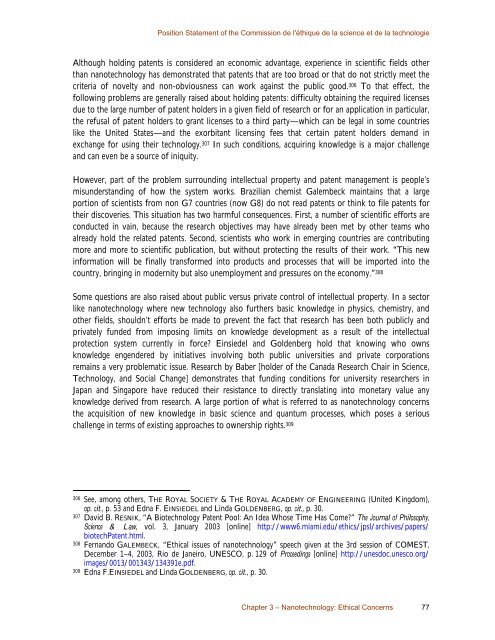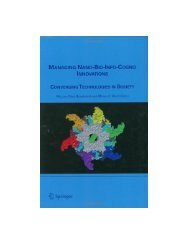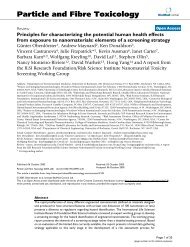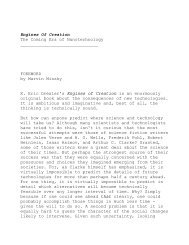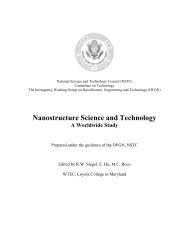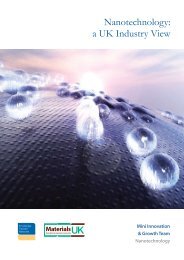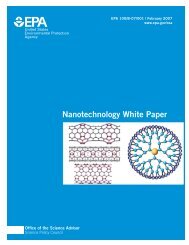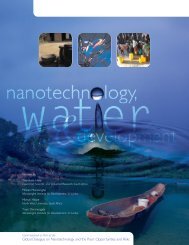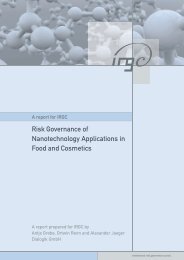A Basis for Action - Commission de l'éthique de la science et de la ...
A Basis for Action - Commission de l'éthique de la science et de la ...
A Basis for Action - Commission de l'éthique de la science et de la ...
You also want an ePaper? Increase the reach of your titles
YUMPU automatically turns print PDFs into web optimized ePapers that Google loves.
Position Statement of the <strong>Commission</strong> <strong>de</strong> l'éthique <strong>de</strong> <strong>la</strong> <strong>science</strong> <strong>et</strong> <strong>de</strong> <strong>la</strong> technologie<br />
Although holding patents is consi<strong>de</strong>red an economic advantage, experience in scientific fields other<br />
than nanotechnology has <strong>de</strong>monstrated that patents that are too broad or that do not strictly me<strong>et</strong> the<br />
criteria of novelty and non-obviousness can work against the public good. 306 To that effect, the<br />
following problems are generally raised about holding patents: difficulty obtaining the required licenses<br />
due to the <strong>la</strong>rge number of patent hol<strong>de</strong>rs in a given field of research or <strong>for</strong> an application in particu<strong>la</strong>r,<br />
the refusal of patent hol<strong>de</strong>rs to grant licenses to a third party—which can be legal in some countries<br />
like the United States—and the exorbitant licensing fees that certain patent hol<strong>de</strong>rs <strong>de</strong>mand in<br />
exchange <strong>for</strong> using their technology. 307 In such conditions, acquiring knowledge is a major challenge<br />
and can even be a source of iniquity.<br />
However, part of the problem surrounding intellectual property and patent management is people’s<br />
misun<strong>de</strong>rstanding of how the system works. Brazilian chemist Galembeck maintains that a <strong>la</strong>rge<br />
portion of scientists from non G7 countries (now G8) do not read patents or think to file patents <strong>for</strong><br />
their discoveries. This situation has two harmful consequences. First, a number of scientific ef<strong>for</strong>ts are<br />
conducted in vain, because the research objectives may have already been m<strong>et</strong> by other teams who<br />
already hold the re<strong>la</strong>ted patents. Second, scientists who work in emerging countries are contributing<br />
more and more to scientific publication, but without protecting the results of their work. “This new<br />
in<strong>for</strong>mation will be finally trans<strong>for</strong>med into products and processes that will be imported into the<br />
country, bringing in mo<strong>de</strong>rnity but also unemployment and pressures on the economy.” 308<br />
Some questions are also raised about public versus private control of intellectual property. In a sector<br />
like nanotechnology where new technology also furthers basic knowledge in physics, chemistry, and<br />
other fields, shouldn’t ef<strong>for</strong>ts be ma<strong>de</strong> to prevent the fact that research has been both publicly and<br />
privately fun<strong>de</strong>d from imposing limits on knowledge <strong>de</strong>velopment as a result of the intellectual<br />
protection system currently in <strong>for</strong>ce? Einsie<strong>de</strong>l and Gol<strong>de</strong>nberg hold that knowing who owns<br />
knowledge engen<strong>de</strong>red by initiatives involving both public universities and private corporations<br />
remains a very problematic issue. Research by Baber [hol<strong>de</strong>r of the Canada Research Chair in Science,<br />
Technology, and Social Change] <strong>de</strong>monstrates that funding conditions <strong>for</strong> university researchers in<br />
Japan and Singapore have reduced their resistance to directly trans<strong>la</strong>ting into mon<strong>et</strong>ary value any<br />
knowledge <strong>de</strong>rived from research. A <strong>la</strong>rge portion of what is referred to as nanotechnology concerns<br />
the acquisition of new knowledge in basic <strong>science</strong> and quantum processes, which poses a serious<br />
challenge in terms of existing approaches to ownership rights. 309<br />
306 See, among others, THE ROYAL SOCIETY & THE ROYAL ACADEMY OF ENGINEERING (United Kingdom),<br />
op. cit., p. 53 and Edna F. EINSIEDEL and Linda GOLDENBERG, op. cit., p. 30.<br />
307 David B. RESNIK, “A Biotechnology Patent Pool: An I<strong>de</strong>a Whose Time Has Come?” The Journal of Philosophy,<br />
Science & Law, vol. 3, January 2003 [online] http://www6.miami.edu/<strong>et</strong>hics/jpsl/archives/papers/<br />
biotechPatent.html.<br />
308 Fernando GALEMBECK, “Ethical issues of nanotechnology” speech given at the 3rd session of COMEST,<br />
December 1–4, 2003, Rio <strong>de</strong> Janeiro, UNESCO, p. 129 of Proceedings [online] http://unesdoc.unesco.org/<br />
images/0013/001343/134391e.pdf.<br />
309 Edna F.EINSIEDEL and Linda GOLDENBERG, op. cit., p. 30.<br />
Chapter 3 – Nanotechnology: Ethical Concerns 77


